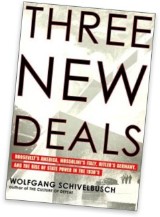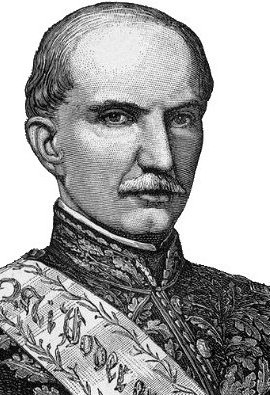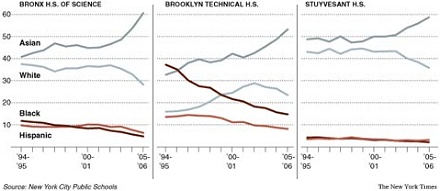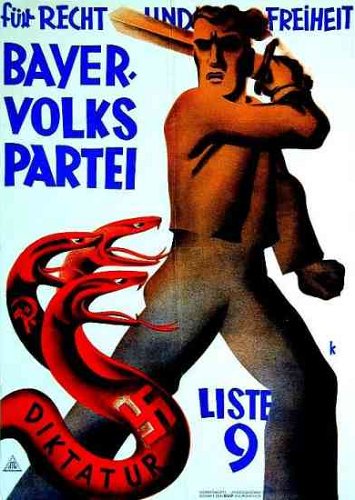Politics
About Andrew Cusack
 Writer, web designer, etc.; born in New York; educated in Argentina, Scotland, and South Africa; now based in London.
Writer, web designer, etc.; born in New York; educated in Argentina, Scotland, and South Africa; now based in London. read more
News
Blogs
Reviews & Periodicals
Arts & Design
World
France
Mitteleuropa
Knickerbockers
Argentina
The Levant
Africa
Cape of Good Hope
Netherlands
Scandinavia
Québec
India
Muscovy
Germany
Academica
Birds of a Feather?

 Were Hitler, Roosevelt, and Mussolini really just different cuts of the same cloth? In a new book, Three New Deals: Reflections on Roosevelt’s America, Mussolini’s Italy, and Hitler’s Germany, 1933-1939, Wolfgang Schivelbusch makes precisely that argument. Interestingly, the National Socialists in Germany looked with fondness towards Roosevelt’s style of rule. The Nazi party newspaper Völkischer Beobachter actually praised “the adoption of National Socialist strains of thought in his economic and social policies” while Mussolini also saw a bit of himself in FDR. Roosevelt wouldn’t give the time of day to Herr Hitler but was actually quite fond of Signor Mussolini, calling him “that admirable Italian gentleman”.
Were Hitler, Roosevelt, and Mussolini really just different cuts of the same cloth? In a new book, Three New Deals: Reflections on Roosevelt’s America, Mussolini’s Italy, and Hitler’s Germany, 1933-1939, Wolfgang Schivelbusch makes precisely that argument. Interestingly, the National Socialists in Germany looked with fondness towards Roosevelt’s style of rule. The Nazi party newspaper Völkischer Beobachter actually praised “the adoption of National Socialist strains of thought in his economic and social policies” while Mussolini also saw a bit of himself in FDR. Roosevelt wouldn’t give the time of day to Herr Hitler but was actually quite fond of Signor Mussolini, calling him “that admirable Italian gentleman”.
That there were massive differences between the three is obvious. (Mussolini and Hitler came to the brink of war over Austria, and later they both had a war with Roosevelt). Nonetheless, the similarities are worth pointing out, and David Gordon has written a review of the book over at the Ludwig von Mises Institute. Give it a read.
Without family & faith we’ve lost our way
by JOHN HALDANE
THE SCOTSMAN | Friday 1 September 2006
DR JOHNSON’S memorable observation that “nothing so concentrates the mind as the prospect of imminent hanging”, has provided a formula for highlighting other attention-focussing threats. Currently, for example, the minds of Scotland’s MSP’s may be said to be concentrated by nothing so much as by the prospect of next year’s Holyrood elections.
It is reported that Labour and the SNP are each holding strategy discussions to prepare for May’s poll. The latter in hope of victory, the former in fear of defeat. Meanwhile, the Liberal Democrats try to look principled while yet pondering the best bet for coalition partners; Conservative MSPs are under attack from within their own party for their mediocre performance; and Scottish Socialists are breaking apart and regrouping in smaller cells. Concentrating the mind is rarely easy, often uncomfortable, and sometimes destructive.
So much for the politicians, what of the electorate? or more aptly, in times of declining voter participation, what of the people of Scotland? It is clear that here, as in the UK more generally, people have little confidence not only in politicians but in politics. Apart from cynicism encouraged by decades of scandals which, whatever their differences, give the general impression of exploitation of office; there is the feeling that most policies simply fail to make life better.
La Fallaci is Dead
Leftist Italian Writer, Atheist, Defender of the West, Sometime New Yorker, Once Made the Ayatollah Laugh

Oriana Fallaci, that indomitable and cantankerous Italian, has finally succumbed to cancer in her native land. When she first learnt of her cancer years ago, she kept smoking and refused to treat it because she had “too much writing to do”. Later, when it became difficult to eat solid foods, she drank champagne instead. Her 1972 interview with Henry Kissinger was described by him as “the single most disastrous conversation I have ever had with any member of the press”.
While an ardent leftist, she was an unrepentant foe of what she saw as the Islamic colonization of Europe. Her diatribes against the Muslim immigrants who habitually pissed on the walls of Florence cathedral earned her the ire of many, and legal proceedings were initiated against her in France. The liberal commentator Christopher Hitchens described her work as “an example of how not to write about Islam”. She began writing her infamous The Rage and the Pride, a book teeming with passion and righteous indignation, on September 11, 2001 at her home in New York.
Fallaci said she felt encouraged when Cardinal Ratzinger, another thinker who warned against Western self-loathing, was elected pope. “I feel less alone when I read the books of Ratzinger,” she wrote. The Telegraph reports that the Holy Father granted her a private audience a number of months ago, on the condition that never disclose its contents.
Oriana Fallaci will be buried tommorrow in the family tomb in the Protestant Cemetery in Florence. There will be no funeral; I hope a priest will say a mass for the repose of her soul.
Daily Telegraph obituary
Times of London obituary
‘La journaliste Oriana Fallaci est morte’, Le Figaro
Elephant Season Begins November 7
 We don’t often like discussing politics because it’s such a filthy business these days, and besides, if there’s anything worth saying about politics, no doubt Daniel Larison has already said it. Nonetheless, it is interesting to see the schadenfreude developing amongst conservatives eager to see the Republican Party wreap what it hath sewn come the midterm elections of November 7 this year. The GOP has really done it this time, or so says the common wisdom, and the combined effect of conservatives staying home on Election Day and of swing voters swinging to the Democrats may very well throw the House of Representatives to the Democrats for the first time in twelve years. The glee conservatives once exhibited only for the most delightful defeats of Democrats is now, in a truly bi-partisan spirit, extended to the Republicans as well.
We don’t often like discussing politics because it’s such a filthy business these days, and besides, if there’s anything worth saying about politics, no doubt Daniel Larison has already said it. Nonetheless, it is interesting to see the schadenfreude developing amongst conservatives eager to see the Republican Party wreap what it hath sewn come the midterm elections of November 7 this year. The GOP has really done it this time, or so says the common wisdom, and the combined effect of conservatives staying home on Election Day and of swing voters swinging to the Democrats may very well throw the House of Representatives to the Democrats for the first time in twelve years. The glee conservatives once exhibited only for the most delightful defeats of Democrats is now, in a truly bi-partisan spirit, extended to the Republicans as well.
Why will conservatives stay home on Election Day? Well, that is not the right question, as it is the natural inclination of the conservative to be at home. The question then is: why should a conservative vote Republican? The President, for starters, is an ardent devotée of liberal internationalism abroad and wants to impose it with our military, which he has disgracefully abused as his own little plaything. In Congress, meanwhile, the Republican majorities in both houses have enacted an orgy of spending and goverment largesse as if the concept of self-restraint is foreign and irrelevant, while refusing to act on issues important to conservatives, such as border enforcement.
 Voting Republican means we get liberal internationalism at our own expense (in blood, mind you, not just taxes), while at home we get porous borders (despite the terrorist threat), implicitly condoned illegal immigration (it’s good for business!), egregious spending (the ‘compassionate conservatism’ which is neither compassionate nor conservative), and the expansion of the powers of the federal government (continuing and augmenting the flagrant breaches of the Constitution which began in the 1960’s). Such being the case, the real question should be: what kind of self-respecting conservative would support such things with his vote?
Voting Republican means we get liberal internationalism at our own expense (in blood, mind you, not just taxes), while at home we get porous borders (despite the terrorist threat), implicitly condoned illegal immigration (it’s good for business!), egregious spending (the ‘compassionate conservatism’ which is neither compassionate nor conservative), and the expansion of the powers of the federal government (continuing and augmenting the flagrant breaches of the Constitution which began in the 1960’s). Such being the case, the real question should be: what kind of self-respecting conservative would support such things with his vote?
But of course there is a silver lining. As much as conservatives may delight in seeing the Republicans thrown from office, in our two-party system the defeat of Republicans means the victory of Democrats. This is most unfortunate. However, with the appointments of Roberts and Alito to the Supreme Court (which will likely be remembered as one of G.W. Bush’s few conservative acts in his eight years as president), there is a feeling that sooner or later the highest court in the land will hear cases which return power to the states, as ordained in the Constitution. Having Democrats in charge, given their traditional predilection for centralization, might further spur such cases to come to the fore.
So farewell, then, GOP majority… and good riddance. Think about what you’ve done and come back in a few years. We are good Christian folk, after all, and forgiving; we will likely give you another chance in the future.
NOTE: I should clarify that we are speaking in this post only about the federal government. No doubt there are many decent conservative and conservative-leaning GOP officeholders on the state and local level.
The Unique Genius of Our American Democracy
“A famous Loyalist said that ‘I would rather be ruled by one tyrant 3,000 miles away, than by 3,000 tyrants not a mile away.’ It is the unique genius of our system (given that D.C. is 3,000 miles away from my home here in Los Angeles) that we are able to have both.”
‘We Stand By You’
Old Europe Lives?

 An incident took place at sea on September 14, 2001, just a few days after the attacks on New York and Washington, which has not been widely recounted. In the time leading up to September 11, the U.S.S. Winston S. Churchill was in port in Plymouth, England, where it was moored next to the Lütjens of the German Navy. During their time in port together, the officers and crews of the Churchill and the Lütjens had combined for a number of lively convivial undertakings in the generous spirit of friendship and brotherhood. After the attacks, however, Churchill immediately put to sea to perform a number of drills while maneuvering back in forth in the same area.
An incident took place at sea on September 14, 2001, just a few days after the attacks on New York and Washington, which has not been widely recounted. In the time leading up to September 11, the U.S.S. Winston S. Churchill was in port in Plymouth, England, where it was moored next to the Lütjens of the German Navy. During their time in port together, the officers and crews of the Churchill and the Lütjens had combined for a number of lively convivial undertakings in the generous spirit of friendship and brotherhood. After the attacks, however, Churchill immediately put to sea to perform a number of drills while maneuvering back in forth in the same area.
“It hasn’t been that fun I must confess,” an ensign aboard the Churchill wrote home, “and to be even more honest, a lot of people are frustrated at the fact that they either can’t be home, or we don’t have more direction right now. We have seen the articles and the photographs, and they are sickening. Being isolated as we are, I don’t think we appreciate the full scope of what is happening back home, but we are definitely feeling the effects.”
“About two hours ago the junior officers were called to the bridge to conduct Shiphandling drills. We were about to do a man overboard when we got a call from the Lutjens. […] Now at sea they called over on bridge-to-bridge, requesting to pass us close up on our port side, to say good-bye.”
“We prepared to render them honors on the bridgewing, and the Captain told the crew to come topside to wish them farewell. As they were making their approach, our Conning Officer announced through her binoculars that they were flying an American flag. As they came even closer, we saw that it was flying at half-mast. The bridgewing was crowded with people as the Boatswain’s Mate blew two whistles – Attention to Port – the ship came up alongside and we saw that the entire crew of the German ship were manning the rails, in their dress blues. They had made up a sign that was displayed on the side that read ‘We Stand By You’.”
As the ensign wrote later in the email, “It’s amazing to think that only a half-century ago things were quite different,” and it’s interesting to note that both ships are named after figures from the Second World War; Winston Churchill the half-American Prime Minister of Great Britain, and Günther Lütjens the admired German Admiral who died aboard the Bismarck.

‘Villiers Prepares His Offensive’

Philippe de Villiers is preparing his campaign for the 2007 presidential election, Le Figaro recently reported, after having conducted an informal tour of holiday spots around France to bring his candidacy to vacationing voters. As the articles notes, one of the most important challenges for de Villiers and his Mouvement pour la France (MPF) is carving out a niche in the media for his campaign. Press coverage of the 2007 competition has portrayed the election as a showdown between the Socialist Party’s Ségolène Royal and the UMP’s Nicolas Sarkozy, a lack of fundamental differences between the two candidates on the major issues notwithstanding.
Despite a number of recent high-ranking defections to the MPF from the populist/nationalist Front National, the party which usually takes third place after the UMP and the Socialists, it’s unknown whether a significant portion of the Front‘s electoral base with follow through and vote for de Villiers instead of the FN’s Jean-Marie Le Pen. During last year’s referendum on the EU constitution, de Villiers swept the rug from under Le Pen’s feet by masterfully organizing the right wing of the successful ‘No’ campaign himself. If the Vendéen can repeat such a performance and seize the electoral momentum from the misanthropic FN leader, there’s a chance of both making it to the second electoral round and putting the ugly spectre of Le Penisme in its grave.

Le Figaro: Philippe de Villiers will carry out a tour of France this fall with MPF secretary-general Guillaume Peltier.
In an interview with le Figaro, the MPF’s second-in-command Guillaume Peltier proclaimed that “France needs a candidate who personifies the real Right and who will commit the country to a break with socialism”. When asked about the MPF’s policy on the impôt sur la fortune (ISF) tax on wealth, Peltier refreshingly replied “We propose its repeal, pure and simple”.
“The ISF strikes great fortunes less and less while striking middle-class homeowners more and more,” Peltier claimed. “Because of real estate prices are on fire, one finds farmers who do not even qualify to pay income tax who are stuck with the ISF. The UMP, with the capability for four years, has not done anything to end this unjust situation.”
And Europe? “Instead of an incomprehensible constitution, we propose a European charter on three points: 1) A truly European Europe, without Turkey; 2) A democratic Europe directed by the parliaments and by the peoples, and not by the technocrats of Brussels; and 3) A Europe of free cooperation against terrorism, drug trafficking, and organised crime.” The MPF would also support a referendum on whether to continue France’s participation in the Euro monetary union.
And finally, his prediction for 2007: “I consider that Philippe de Villiers will be in 2007 what the ‘Non’ was in 2005. Villiers is the only candidate of rural France, the candidate of the France of common sense. I’m persuaded he can make it to the second round. I see a Villiers/Royal run-off, the real Right against the real Left.”
Previously: On Walkabout with Philippe de Villiers
Gabriel García Moreno
Ecuador’s Saintly President

WE LIVE IN an age which is almost completely devoid of Christian statesmen. In their stead, we are today ruled by faceless bureaucrats and vapid masters of spin. Gentlemen once sought public office in the hopes of ensuring order and the public good while dark and knavish men sought the same in their lust for power. The politicians of today, meanwhile, tend to be of neither inspiration but rather seem all too often to have engaged upon the ‘career’ of ‘public servant’ because they lack any of the skills necessary to succeed in any real, productive employ, station, or vocation. Given the sad state of affairs in our day, we must look to the past — to another age and indeed another continent — in our search for models of Christian leadership in the temporal realm of a modern republic. In this search, the name of the journalist, scholar, statesman, and saint, President GABRIEL GARCÍA MORENO of Ecuador, stands taller than any other in the Americas. (more…)
The Farm Killings of South Africa
The above video is a ten-minute portion of a South African news programme exploring the brutal killings of innocent farmers in that country. It is most certainly worth watching, with the caveat that it’s not for the faint of heart. It is astonishing that people can live in such a climate of violence and fear. “But with the Lord’s strength, I’m here,” says one victim.
Even more appalling once you’ve watched that video is to watch the video below of South Africa’s Safety and Security Minister, Charles Nqakula, attacking those who complain about the rise in rape and murder. “They can continue to winge until they are blue in the face, they can continue to be as negative as they want to or they can simply leave this country.” It doesn’t take a genius to understand that the ‘they’ he speaks of is the community of white South Africans. Plus ça change, eh?
Further along the theme of South African online videos, why not watch the trailer for the upcoming film ‘Catch A Fire’? Soon to be released by Focus Features, the film tells the true story of Patrick Chamusso, a man brutally tortured by the police while falsely accused of terrorism. He is freed when they realize he is innocent, but soon makes up for his innocence by, you guessed it, becoming a terrorist.
Racialist Thinking Behind the Times

The fair-minded, independent observer would look at the figures above and think to himself “Interesting, the proportion of Asian students is on the rise, while that of White, Black, and Hispanic students is generally in decline”. However the racialists (I will not use the more loaded term of ‘racist’, though the meaning is exactly the same) at the New York Times can only see the Black and Hispanic decline, captioning the chart ‘The share of black and Hispanic students New York City’s three most elite specialized schools has declined’.
And why no chart depicting the racial make-up of the also public selective Hunter College High School? Is it, by some unknown criterion, not in the same league or perhaps the proportion of black and Hispanic students there actually rose? The Times reader is left uninformed as to the greater picture, but suitably inculcated in racialist thinking.
Gothamist’s Jen Chung notes the decline is “in spite of the city’s best efforts to encourage [Black and Hispanic students] to apply and attend” while City Councilman Robert Jackson ponders “”Is it institutional racism or is it something else?”.
Could it perhaps be that the racial makeup of the city’s elite public high schools is subject to (quel horreur!) occasional fluctuations? What is the racial makeup of an elite public high school “supposed” to be? Here’s a concept worth considering: how about giving the students in selective public high schools the best education on offer and admit students based purely on a meritocratic standard which does not descriminate by sex, race, class, or creed? Just a thought.
On Walkabout with Philippe de Villiers

Viscount Philippe le Jolis de Villiers de Saintignon is the head of the French political party Mouvement pour la France, and one of the leading voices against the Islamisation of France. The MPF is, in some sense, the ‘Catholic’ party on the French right, being conservative and traditionalist in contrast to the Front National (headed by the genial misanthrope Jean-Marie le Pen), which is thoroughly republican and nationalist. De Villiers has been trying to encourage patriotism in contrast to the nationalism of the FN and the continentalism of the other parties.
A native of the Vendée, he led the right flank (so to speak) in the May 2005 French referendum against the European Constitution. The rejection of the Constitution by the French voters has put the nefarious project on hold, though likely not for long. (The established precedent with European treaties of this nature is for the ruling bureaucratic elite to hold as many referenda as it takes to pass). Let’s follow le bon vicomte and see what he’s up to these days…
Monarchs and Presidents in Islam
National Review, Nov 21, 1986
by Erik von Kuehnelt-Leddihn
IN THE Islamic world’s relations with Israel, the hard-liners are the various Arab and non-Arab republics. When there is any sign of softness, it comes, almost always, from one of the monarchies. (Egypt, and Egypt alone, is the exception.) It thus did not come as a great surprise that King Hassan II of Morocco agreed to meet with the then Israeli prime minister, Shimon Peres, this summer.
While individual monarchs historically may have been capricious or cruel, monarch as an institution is inclined to be generous: Montesquieu has told us that while the driving element in republics is virtue, in monarchies it is clemency. And, indeed, the Islamic monarchs of old were infinitely more tolerant than their modern republican successors. They traveled extensively, and many had a cosmopolitan outlook. Some had relatives abroad. When King Hassan II of morocco writes to members of Europe’s royal families, he addresses them as “cher cousin” or “chere cousine,” since he is a descendant of Mohammed’s daughter Fatima, as by now are all the Christian royal families. (Many centuries ago, a Moroccan prince was taken prisoner by the Castilians and converted in captivity. After his release he married into a princely family, and over the centuries his bloodline has spread into countless aristocratic and royal families.) In chooing their administrators, officers, diplomats, bankers, and doctors, Islam’s monarchs looked for able men regardless of religion, never caring whether their choices were popular or not.
It is true that local slaughters of Christians took place in various parts of the Turkish Empire, but things got really bad only when the enlightened, highly nationalistic Young Turks appeared on the scene. Their political organization was called “Unity and Progress,” by which they meant ethnic uniformity and modern methods. It was they who were behind the big Armenian massacres during World War I. The Turkish sultans, by contrast, frequently gave preferment to Christians (and sometimes Jews) in high positions. The Phanariotic Greeks, so called after the Lighthouse Quarter of Constantinople in which most of them lived, acted as trusted administrators; the governors of the Rumanian-speaking provinces, for instance, were taken from their families.
Very typical is the story of a family known to me. Originally called Black, they were Scots and good Catholics who emigrated after the fall of the Stuarts and settled in France, where they Gallicized their name. There are still Blacques in France, but one branch of the family emigrated to Turkey, where its scions made a splendid career without changing either their name or their religion. One of them, Edward Blacque-Bey, became the last Turkish imperial ambassador in Washington. (His sons, too, made diplomatic careers. One married an American, and his son, having graduated from Harvard, became a colonel in the U.S. Marines and later an American diplomat.) Edward Blacque-Bey wore a fez and was a loyal subject of the sultan, under whom Constantinople became an international metropolis. All this ended with the republic under Ataturk.
Similar conditions existed in the kingdom of Egypt before Nagib and Nasser. Forty per cent of the administrators and civil servants were Coptic Christians, who considered themselves the genuine descendants of the Old Egyptians. Before 1952 Cairo was an eastern Paris, where Christians and Jews played an important role–socially, commercially, politically, Arab nationalism put an end to all this, not only in Cairo, but also in Alexandria, which is so well described in Lawrence Durrell’s Alexandria Quartet. In Iran–a non-Arab state–the old monarcy under the Kajar dynasty and the more recent one under the Pahlavis were notably tolerant. Non-Muslims (such as the still-surviving Zoroastrians) could make all sorts of careers, and the country’s political orientation was Western. The window to the West remains open in the Islamic monarchies of today–in Morocco, in Saudi Arabia, in Oman, and even in Malaysia.
MONARCHIES HAVE the advantage that, although they might be oppressive toward the political ambitions of their subjects, they are never totalitarian. To my knowledge there is no Jewish community left in Algeria, but there still is a small one in Morocco. Variety is the keynote of monarchies, and with it goes internationalism. In 1910 only two sovereign nations in Christian Europe had truly native dynasties: Serbia and Montenegor. (Peter III was the last genuine Romanov; the Hohenzollerns were not Prussians but Swabians; and so forth.) These dynasties could often follow unpopular policies, both domestic and foreign. Popular policies are not always good for the country, and the courage required to stick to an unpopular good policy is immensely rare among politicians in democracies. They crave popularity and want, above all, to be re-elected. King Hassan II might be trembling lest he be assassinated by fanatics, but he pursues policies that he considers to be right. He certainly is not guided by Sir Henry Campbell-Bannerman’s idiotic dictum, “Self-government is better than good government,” which is roughly equivalent to saying that self-treatment in case of illness is better than treatment by a qualified physician.
The Felicity of Chronicles
 In the midst of my summer indolence, reading Chronicles proves to be one of the most nourishing experiences. There is no other monthly (except the New Criterion) which features such good writing on such a variety of subjects and which refuses to take anything for granted. The overwhelming majority of the intellectual culture of the West today lazily presupposes agreement with Enlightenment concepts and all that nasty business unleashed by the French Revolution. Chronicles dares ask the question “What if they’re wrong?” and quite often posits the statement “Actually, they are wrong!” which then opens the door to truly considering, well, all the aspects of society; this even though Chronicles rather humbly subtitles itself ‘A Magazine of American Culture’.
In the midst of my summer indolence, reading Chronicles proves to be one of the most nourishing experiences. There is no other monthly (except the New Criterion) which features such good writing on such a variety of subjects and which refuses to take anything for granted. The overwhelming majority of the intellectual culture of the West today lazily presupposes agreement with Enlightenment concepts and all that nasty business unleashed by the French Revolution. Chronicles dares ask the question “What if they’re wrong?” and quite often posits the statement “Actually, they are wrong!” which then opens the door to truly considering, well, all the aspects of society; this even though Chronicles rather humbly subtitles itself ‘A Magazine of American Culture’.
The August 2006 edition highlights the convergence between socialism and capitalism in our society and contains much of interest. However we will provide you with only a few good snippets from Thomas Fleming’s piece, ‘Socialism is Theft’.
[…] I remember my astonishment, in the 1980’s, meeting college students who were already talking about which corporations offered the best retirement plans. At that age, I did not imagine I would live to see 25 – and the way I was living more than justified such skepticism. Girls and Greek poetry were my principal inspirations, and Greek still brings pleasure. When a young male is thinking about retirement at the age of 20, he has already given up all hope of ever becoming a man. […]
‘We are all socialists now,’ as Sir William Harcourt observed over a century ago, and nothing has so contributed to the socialist mentality of modern life as the disappearance of private property, not only as reality but even as an ideal. American mobility, combined with the frenetic hallucination that ‘ending is better than mending,’ has detached Americans, in particular, from local roots. These days, a home is not the place in which your father was born or your grandfather died; homes are sold by the dozens by realtos who are ever eager to help you move up. If a ‘home’ is nothing more than an investment, it is hard to blame the politicians for thinking they could turn your house and lot into a more socially productive investment by selling it to developers. […]
The abuse of eminent domain is only a minor symptom of a much deeper malaise. Our rights of possession are contingent on the power of government at every level to tax property and, if taxes are not paid within a specified period of time, to confiscate it and sell it to the highest bidder. For most of us, this power does not represent an imminent danger, but it is symbolic of our dependency on government. […]
Whatever they may earn, working stiffs who depend for their very existence on government agencies and corporations larger than most nation-states are a far cry from the confident and assured citizens of the old America. The old Americans were men and women few government lackeys wished to provoke. Today, we seem to live at the behest of powerful and impersonal forces. At best, we are their loyal (and timid) retainers.
Is this result – the weakening of our character – intentional? I do not know, but the motives of politicians are always suspect. The most successful lie put forth by neoconservatives is the so-called law of unintended consequences, which would have us believe that the architects of centralized state education, the New Deal, and the Great Society did not realize that the consequence of taking control of schooling might be to transfer authority from families and communities to state and federal bureaucracies, and they never imagined that, in paying people to do nothing, they would not only discourage the necessary habits of work and thrift but undermine the self-reliance and initiative that supposedly characterized the true American. This same political class, we are called upon to believe, had absolutely no idea that the 1965 Immigration Act would dramatically alter the ethnic composition of the United States or that flooding the Horn of Africa with weapons would lead to war. Credat Apella iudeaus!
Socialism marches on, and, in its progress, it attracts more dedicated capitalists and free-enterprise capitalists to the cause. Planned obsolescense in appliances is good, argues one libertarian con man, because we should always be buying the new and improved model. The same argument applies to houses, wives, families, and communities. We are all caught up in Progress Fever, like the Gold Fever that sent so many foolish men to die, far away from all they loved, in California or Montana.
Economic liberty and free enterprise can be maintained only by a certain kind of human character that is created and nourished under certain specific social and cultural conditions. A farmer who farms his own land and defends it with his gun, who supervises the schooling of his children and sits on his church’s vestry, is a far cry from the deracinated consumer who switches houses every five years and pays other people to protect him. The consumer may make and spend far more money, but he does not have a clue as to the meaning of the term economic liberty, and, when times are hard, he will cry like a stuck pig for government to reach out its ever-extending arms to save him from the consequences of his cowardice and greed.
Politician Mentions Chesterton
Hold the Front Page!
 The Canadian Prime Minister, the Rt. Hon. Stephen Harper PC MP, has moved higher in my estimations since I read the transcript of his speech given this past Friday to the Canada-U.K. Chamber of Commerce. The Prime Minister recalled the words of Sir Winston Churchill speaking in Ottawa in 1929 that at the heart of the relationship between Canada and the United Kingdom “is the golden circle of the Crown which links us all together with the majestic past that takes us back to the Tudors, the Plantagenets, the Magna Carta, habeas corpus, petition of rights, and English common law… all those massive stepping stones which the people of the British race shaped and forged to the joy, and peace, and glory of mankind.”
The Canadian Prime Minister, the Rt. Hon. Stephen Harper PC MP, has moved higher in my estimations since I read the transcript of his speech given this past Friday to the Canada-U.K. Chamber of Commerce. The Prime Minister recalled the words of Sir Winston Churchill speaking in Ottawa in 1929 that at the heart of the relationship between Canada and the United Kingdom “is the golden circle of the Crown which links us all together with the majestic past that takes us back to the Tudors, the Plantagenets, the Magna Carta, habeas corpus, petition of rights, and English common law… all those massive stepping stones which the people of the British race shaped and forged to the joy, and peace, and glory of mankind.”
The Prime Minister continued: “Britain gave Canada all that – and much more. Including: Parliamentary democracy; a commitment to basic freedoms; the industrial revolution; and the entrepreneurial spirit and free market economy. Not to mention Shakespeare, Dickens, Kipling, Lewis, and Chesterton.”
Chesterton! How splendid to hear a politician, not to mention a head of government – an American head of government (North American, if you insist) – include G.K. Chesterton as one of the precious gifts of the Mother Country to her far-flung children in the English-Speaking World.
Previously: Dilbert on Gilbert | Chesterton Remembered
‘OUCA flag pilfered by splinter group’
Cherwell, 26 May 2006
THE FLAG of the Oxford University Conservative Association has been stolen by a splinter group and is being held at ransom. David Cochrane and Ian Wellby raised the flag up the Keble flag pole in an act that Cochrane says “claimed Keble for OUCA”.
“This does mark an historic occasion for OUCA as we have essentially created a new OUCA. We have got rid of all the gimps and all is fun now,” he said.
“This is a historical occasion comparable to Labour’s landslide in 1997, the end of the Hundreds Year War, the first time that William Shakespeare put pen to paper, the development of penicillin, or the winning of World War II,” he added.
By the next morning the flag had been taken down by the porters and had been claimed by a group calling themselves the People’s Front for the Liberation of OUCA, and who are believed to be loosely associated with the Moles Dining Club.
The Spiritual Leader of the People’s Front for the Liberation of OUCA said, “The OUCA colours have been liberated from under the very nose of the criminal Steel. They have been taken ‘Over The Water’. They shall remain there until True Monarchy is restored to OUCA. The nefarious Steel must be deposed and face justice for his manifold crimes.”
An ex-OUCA member who was present when the flag was stolen said that the oversized flag was a tradition, and that their actions were a response to rumours that Charlie Steele, the current OUCA President, planned to sell the flag.
Steel said, “Although it is no bad thing to see the OUCA flag grace the mast of the Keble flag pole, and indeed this is essentially harmless fun, it is very disappointing that people have taken it upon themselves to then steal it the following day. This amounts to nothing more than theft, and the Association will not tolerate illegal behavior of any kind.”
The Dean of OUCA, Reverend David Johnson, said, “It was incredibly stylish to fly the flag from Keble. It was bought at an extortionate cost of £400, and I thought it was ludicrous, but when it was draped over a table I thought it looked rather smart and was sort of nostalgic.”
What of Montenegro?

SO IT APPEARS that the electorate of Montenegro have chosen to end their confederation with Serbia (c.f. BBC News, “Montenegro ‘chooses independence’“). It is my firm belief that the more local a government, the better it is, and that decisions ought to made at the level closest to those they affect. This is more or less the idea of subsidiarity so enshrined in Catholic social teaching, especially in Leo XIII’s Rerum Novarum and Pius XI’s Quadragesimo Anno, and rather implicit in the Tenth Admendment of the U.S. Constitution (which, to my mind, has proved to be the greatest component of the Bill of Rights).
 Believing in subsidiarity, I am also inclined to believe that (up to a certain point) the smaller a state the better. (The ideal of government, after all, lies in hereditary principalities and kingdoms under a superceding imperial monarch, akin to the Holy Roman Empire). So does this mean that Montenegrin independence would be a good thing? Not necessarily. Essentially, the only disagreement between the governments of Montenegro and Serbia is that Montenegro wants to stomp out its own traditional culture and become an other outpost of boring liberal capitalism very very quickly. Serbia wants to do the same, but only quickly instead of very quickly. Look at the leadership of any European country today and you will see leaders who, despite their ritually professed anti-Americanism, want to erase their own traditional cultures and turn their countries into little cookie-cutter states slavishly beholden to American “popular culture”. (Regional differences in architecture are all that will be allowed to remain, as they encourage tourism, which itself is another destroyer of genuine organic culture). The governments of both Serbia and Montenegro certainly subscribe to this vision of a bright liberal, corporate future so Montenegro’s proposed separation is merely an exercise in trying to join the country club before the family next door.
Believing in subsidiarity, I am also inclined to believe that (up to a certain point) the smaller a state the better. (The ideal of government, after all, lies in hereditary principalities and kingdoms under a superceding imperial monarch, akin to the Holy Roman Empire). So does this mean that Montenegrin independence would be a good thing? Not necessarily. Essentially, the only disagreement between the governments of Montenegro and Serbia is that Montenegro wants to stomp out its own traditional culture and become an other outpost of boring liberal capitalism very very quickly. Serbia wants to do the same, but only quickly instead of very quickly. Look at the leadership of any European country today and you will see leaders who, despite their ritually professed anti-Americanism, want to erase their own traditional cultures and turn their countries into little cookie-cutter states slavishly beholden to American “popular culture”. (Regional differences in architecture are all that will be allowed to remain, as they encourage tourism, which itself is another destroyer of genuine organic culture). The governments of both Serbia and Montenegro certainly subscribe to this vision of a bright liberal, corporate future so Montenegro’s proposed separation is merely an exercise in trying to join the country club before the family next door.
Both countries aim to meet the same doom, so whether they go together or not is largely an irrelevance. Of course, if they had any sense in Belgrade and Podgorica, they’d restore their monarchies and take a peek into the ideas of Christian Democracy, a philosophy which is rather neglected these days (most especially by Christian Democratic parties, naturally). But we will lament the neglect of Christian democratic ideas (which, despite the name, are not necessarily democratic) on some other day.
Justice Alito’s First Judgement
The AP doesn’t have a clue… Yeah, so what else is new?
YOU’VE GOT TO hand it to the mainstream media and the depth of their understanding of American Conservatism. Just a short time ago Chief Justice Roberts began his tenure in that office by handing down a decision which dealt with some aspect of physician-assisted suicide in Oregon. Just today Samuel Alito, the Supreme Court’s newest member, handed down a decision regarding an inmate on Death Row in Missouri. In both cases the new justices handed down opinions siding with the constructionist school of constitutional law rather than the activist school. Yet in both circumstances the media reported it as first Roberts and now Alito somehow being un-conservative. The Associated Press headlined a piece released minutes ago ‘Alito Splits With Conservatives on Inmate‘.
Why has the media interpreted these decisions as somehow unconservative? Such an interpretation fits perfectly into the mindset of the judicial activist. Since about a third of our readers are British I will take a moment to explain.
Conservatives in America for the most part are constructionists when it comes to the Constitution. This means they believe that when it comes to settling constitutional disputes, the Supreme Court should go primarily with what the Constitution actually says, and if there is room for interpretation on the meaning of what it says, then we should persue the original intent of the words as best we can. Because the Fathers of the Constitution happened to write a lot (The Federalist Papers etc.) in many cases discovering the original intent is not hard. Constructionists believe that it is unlawful (and unconstitutional, naturally) to change the Constitution by any means except that which the Constitution provides (namely, the amendment process). Most liberals, on the other hand, tend to believe in judicial activism, the school which claims the Constitution is a “living, breathing document” and our interpretation of it should change to suit the age; effectively they want the ability to change the Constitution via reinterpretation every generation.
BUT THE FATHERS of the Constitution effectively made three points with the document: 1) The importance of stability and order, 2) The occasional necessity of change, and 3) The necessity for change to be slow and have a wide support-base. They emphasized the first point by making a constitution in the first place, which implies that the intent to create a settled order of government to stand the test of time. Then there is the second point: in order to stand the test of time, it is sometimes necessary to tweak with the settled order, to further define it just a bit so we can continue to enjoy our freedoms and liberties. The Fathers of the Constitution allowed for this necessity by allowing for the Constitution to be amended via the means in Article V of that document. Which continues to the third point, the requirement that major changes be slow and have an exceptionally broad base of support. The Fathers emphasized this by making the process of amendment so difficult. To lawfully change the Constitution requires a resolution proposing an amendment to be passed by two-thirds of both houses of Congress, a mean feat in and of itself, but even then it only becomes law if it is ratified by at least three-fourths of the States (either by their legislatures or by special conventions convened for that specific purpose). The other method, so far unused, is for two-thirds of the States to request Congress to call a national convention for the purpose of proposing an amendment, then subject to the same methods of ratification. Either way, it’s not an easy task but therein lies the point: liberty and order are best served by a stable framework of government, which is impossible if it’s being continually fiddled with.
The proof is in the pudding, so to speak. If you except the Great British Constitution (which with the effective neutering of the upper house and the submission to the rule of Brussels has, since 1997, changed beyond recognition), then the Constitution of the United States has been the longest-lasting constitution still in force in the history of the world. That’s no small task.
Thus penumbras wane?
BUT BACK TO Roberts and Alito. The media claimed Roberts was breaking with conservatives because he refused to strike down a lower court’s ruling that an Oregon physician-assisted suicide laws were constitutional. The Associated Press, meanwhile, judged Alito as “splitting with conservatives” for “refusing to let Missouri execute a death-row inmate contesting lethal injection”. Because the media are generally in the same liberal camp as the judicial activism proponents they think like judicial activists and a judicial activist would think “Gee, Alito’s conservative so he opposes physician-assisted suicide so he’ll rule against it.” But that’s the point, you ninnies! The job of a Supreme Court justice is to interpret the Constitution not to usurp the legislative authority of Congress by deciding to follow our own whims, fancies, and personal beliefs. The Supreme Court justice must not say whether a law was right or wrong, or whether he would’ve voted for it, he must ask “Does this law contravene the Constitution of the United States” and if it does not then he is obligated to rule as such and to let the law stand regardless of his personal opinion of the law. Legislative power is appropriately invested in Congress, not the Supreme Court nor the President, and the seperation of powers is fundamental to the continued success of our Constitution.
Chief Justice Roberts and Justice Alito have ruled according to the law rather than to their own respective whims. This is to be commended, and could set the tone for the Roberts court as a return to normality after the white squall of Holmesian jurisprudence and spark a concurrent deemphasis of federal power. We can only hope and pray it will be so.
Sir John Cowperthwaite
St Andrean Responsible for Hong Kong’s ‘Economic Miracle’
 Sir John Cowperthwaite was the main figure responsible for Hong Kong’s economic transformation, lifting millions of people out of poverty. While scholars like Milton Friedman and F. A. Hayek put an intellectual case for the free markets, it was Cowperthwaite who provided the textbook example showing economically liberal policies leading to swift economic development. His practical example provided confidence to the Thatcher and Reagan governments, and was a key influence in China’s post-Mao economic liberalisation.
Sir John Cowperthwaite was the main figure responsible for Hong Kong’s economic transformation, lifting millions of people out of poverty. While scholars like Milton Friedman and F. A. Hayek put an intellectual case for the free markets, it was Cowperthwaite who provided the textbook example showing economically liberal policies leading to swift economic development. His practical example provided confidence to the Thatcher and Reagan governments, and was a key influence in China’s post-Mao economic liberalisation.
Cowperthwaite read classics at St Andrews and Christ’s College, Cambridge. While waiting to be called up by the Cameronians (Scottish Rifles), he went back to St Andrews to study economics. This Scottish education imbibed him with the ideas of the Enlightenment, especially the work of Adam Smith, who had been born nearby in Kirkcaldy. He was a liberal in the 19th century sense, believing that countries should open up to trade unilaterally. In 1941, he joined the Colonial Administrative Service in Hong Kong. When it fell to the Japanese, he was seconded to Sierra Leone as a district officer, before returning in 1946 to help the colony’s economic recovery. “Upon arrival,” the Far Eastern Economic Review put it, “he found it recovering quite nicely without him.” He quickly worked his way up the ranks and was made Financial Secretary in 1961, in charge of its economic policy for a decade.
When he became Financial Secretary, the average Hong Kong resident earned about a quarter of someone living in Britain. By the early 90s, average incomes were higher than Britain’s. Cowperthwaite made Hong Kong the most economically free economy in the world and pursued free trade, refusing to make its citizens buy expensive locally-produced goods if they could import cheaper products from elsewhere. Income tax was never more than a flat rate of fifteen percent. The colony’s lack of natural resources, apart from a harbour, and the fact that it was a food importer, made its success all the more interesting. Cowperthwaite’s policies soon soon attracted the attention of economists like Milton Friedman, whose television series Free to Choose featured Hong Kong’s economic progress in some detail.
Asked what is the key thing poor countries should do, Cowperthwaite once remarked: “They should abolish the Office of National Statistics”. In Hong Kong, he refused to collect all but the most superficial statistics, believing that statistics were dangerous: they would led the state to to fiddle about remedying perceived ills, simultaneously hindering the ability of the market economy to work. This caused consternation in Whitehall: a delegation of civil servants were sent to Hong Kong to find out why employment statistics were not being collected; Cowperthwaite literally sent them home on the next plane back.
Cowperthwaite’s frugality with taxpayers’ money extended to himself. He was offered funds from the Hong Kong Executive to do a much needed upgrade to his official residence, but refused pointing out that since others in Hong Kong did not receive that sort of benefit, he did not see why he should.
Cowperthwaite’s hands off approach, and rejection of the in vogue economic theory, meant he was in daily battle against Whitehall and Westminster. The British government insisted on higher income tax in Singapore; when they told Hong Kong to do the same, Cowperthwaite refused. He was an opponent of giving special benefits to business: when a group of businessmen asked him to provide funds for tunnel across Hong Kong harbour, he argued that if it made economic sense, the private sector would come in and pay for it. It was built privately. His economic instincts were revealed in his first speech as Financial Secretary: “In the long run, the aggregate of decisions of individual businessmen, exercising individual judgment in a free economy, even if often mistaken, is less likely to do harm than the centralised decisions of a government, and certainly the harm is likely to be counteracted faster.”
His ability to pursue policies which, at the time, were deeply unfashionable, was helped by having supportive Hong Kong Governors, Sir Robert Black and Sir David Trench, who both had free market sympathies. Moreover, Cowperthwaite was formidable at arguing his case: as Dennis Healey recalled: “I always retired hurt from my encounters with the redoubtable Financial Secretary.”
From 1972 to 1981, Cowperthwaite was an advisor to Jardine Flemming & Co in Hong Kong. He retired to St Andrews with his wife Sheila and was an active member of the Royal & Ancient. For many years, he spent six months of the year with his wife traveling the world visiting friends and relatives. He was an old school civil servant and, much to the frustration of economists, resisted requests to write an autobiography about his time in Hong Kong, believing that his duty was to serve, not to reveal the minutiae of government business.
– John James Cowperthwaite KBE OBE CMG, Financial Secretary of Hong Kong, born 25 April 1915; died 21 January 2006.
Search
Instagram: @andcusack
Click here for my Instagram photos.Most Recent Posts
- Gellner’s Prague December 19, 2024
- Monsieur Bayrou December 18, 2024
- Dempsey Heiner, Art Critic December 17, 2024
- Vote AR December 16, 2024
- Articles of Note: 12 December 2024 December 12, 2024
Most Recent Comments
Book Wishlist
Monthly Archives
Categories




